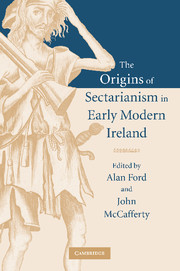Book contents
- Frontmatter
- Contents
- Preface
- List of contributors
- List of abbreviations
- 1 Living together, living apart: sectarianism in early modern Ireland
- 2 Confessionalisation in Ireland: periodisation and character, 1534–1649
- 3 Protestant prelates or godly pastors? The dilemma of the early Stuart episcopate
- 4 ‘In imitation of that holy patron of prelates the blessed St Charles’: episcopal activity in Ireland and the formation of a confessional identity, 1618–1653
- 5 A haven of popery: English Catholic migration to Ireland in the age of plantations
- 6 The Irish historical renaissance and the shaping of Protestant history
- 7 Religion, culture and the bardic elite in early modern Ireland
- 8 The political and religious thought of Florence Conry and Hugh McCaughwell
- 9 Sectarianism: division and dissent in Irish Catholicism
- 10 Purity of blood and purity of faith in early modern Ireland
- 11 Concluding reflection: confronting the violence of the Irish reformations
- Index
10 - Purity of blood and purity of faith in early modern Ireland
Published online by Cambridge University Press: 24 November 2009
- Frontmatter
- Contents
- Preface
- List of contributors
- List of abbreviations
- 1 Living together, living apart: sectarianism in early modern Ireland
- 2 Confessionalisation in Ireland: periodisation and character, 1534–1649
- 3 Protestant prelates or godly pastors? The dilemma of the early Stuart episcopate
- 4 ‘In imitation of that holy patron of prelates the blessed St Charles’: episcopal activity in Ireland and the formation of a confessional identity, 1618–1653
- 5 A haven of popery: English Catholic migration to Ireland in the age of plantations
- 6 The Irish historical renaissance and the shaping of Protestant history
- 7 Religion, culture and the bardic elite in early modern Ireland
- 8 The political and religious thought of Florence Conry and Hugh McCaughwell
- 9 Sectarianism: division and dissent in Irish Catholicism
- 10 Purity of blood and purity of faith in early modern Ireland
- 11 Concluding reflection: confronting the violence of the Irish reformations
- Index
Summary
In 1992, Professor Erik Midelfort, in an essay entitled ‘Curious Georgics: the German nobility and their crisis of legitimacy in the late-sixteenth century’, demonstrated how the attacks of prominent writers such as Sebastian Franck, Nicodemus Frischlin and Cyriakus Spangenberg, upon the legitimacy of the German aristocracy resulted in the foundation of academies for the nobility and in an increasing self-consciousness among nobles concerning the purity of their Christian ancestral blood-lines or Ahnenprobe as a means of proving the legitimacy of their claims to noble privilege. Midelfort set this essay in the context of similar or parallel concerns for purity of blood among the nobilities of Spain and France during the same period, and began with reference to Otto Brünner's remarkable study Adeliges Landleben und europäischer Geist: Leben und Werk Wolf Helmhards von Hohberg, 1612–1688. Brünner's exposition of the life and work of this seventeenth-century Austrian aristocrat and poet revealed how a traditional rural-based noble culture came under threat from the increasing centralisation of power in the early modern Habsburg state and from the rise of what he called a ‘bureaucratic bourgeoisie’ who would later become the noblesse de robe and would displace or eclipse the ancient noblesse d'épée. Central to Brünner's and Midelfort's works is the idea of ‘crisis of the nobility’. The old orders in Spain, the Holy Roman Empire and France felt threatened by the pretensions of a centralising state which claimed the right to ennoble and enfranchise at will.
- Type
- Chapter
- Information
- The Origins of Sectarianism in Early Modern Ireland , pp. 216 - 228Publisher: Cambridge University PressPrint publication year: 2005
- 2
- Cited by



